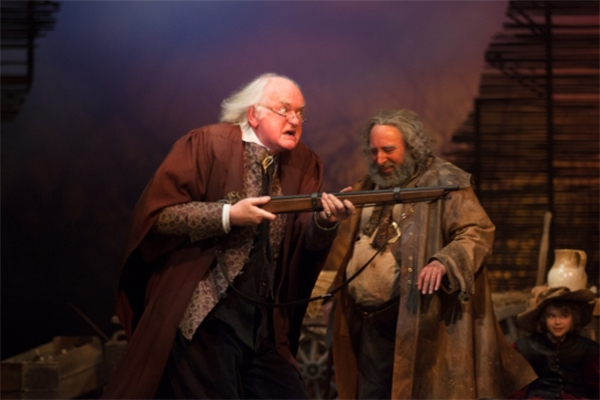Henry IV Part II (Royal Shakespeare Theatre, RSC)

© Kwame Lestrade
It seems that throughout the history of literature and associated arts that the sequel is a very difficult thing to pull off. Whether it is the second novel, the second album or the second play, it is often hard (though not impossible) for the sequel to match the quality or popularity of the original. This has long been perceived to be the issue with Henry IV Part II and Greg Doran's new production does seem to find it a more difficult piece to bring successfully to the stage.
Working with the same strong aesthetic elements – the brilliant set, costumes and lighting – as the first part, the production struggles to make sense of the lack of inherent drama or incident in the play. Yes, there are some great set-piece moments – such as Falstaff and Doll Tearsheet, King Henry's final confrontation with his wayward son and the Gloucestershire scenes – as a play, it lacks the narrative clarity and drive of Part I.
The crowning glory of the production is surely when the action moves to the estates of Justice Shallow. Bathed in a wonderous golden light, these scenes shine out due to the comic genius of Oliver Ford Davies's Shallow and Jim Hooper's Silence. Both bring pinpoint timing to their lines and capture the wistful essence of their characters to perfection. A true joy to behold. They are nearly upstaged by the impish Luca Saraceni-Gunner as Falstaff's page – a young man with a winning smile and a naughty twinkle in his eye, he very nearly steals the show from under the noses of his much older colleagues.
This is not to say that there is a lack of good work in the rest of the production. Alex Hassell continues to impress as his Hal matures into his regal role and you get a glimpse of what his reign as Henry V will be like. There is an inner steel to his performance which is very interesting to see develop.
The weakness, of the production rather than the play, is the decision to make Pistol into such an explosively violent individual. There is no doubting from the text that he is a larger than life character but the interpretive choices seem to put him at odds with the way the rest of the cast were approaching their roles. He certainly made an impact – but not, for me, in a positive way.
Antony Sher continues to relish every word as Falstaff. However I do feel that we were presented with more of Falstaff's many words than is absolutely necessary. The production comes in at a weighty three hours and ten minutes – and that is too long for the material to sustain the interest of the audience. There is scope for at least twenty minutes to be taken out without damaging the structure of the piece or our enjoyment of the characters. Much of this can be achieved by looking at the overall pacing of the production but cutting is going to be necessary to make this a tauter and more engaging view of the play.
Doran and his cast do capture the melancholic spirit of the plays – with the many departures and farewells that punctuate the action – but it is an unbalanced and overlong production that does not succeed in all that it sets out to do.
I am certain that when we return for Henry V (with 2015 marking the 600th anniversary of Agincourt, this must surely be on the cards for next year), we will continue to see the RSC delivering strong productions of the great history plays.










